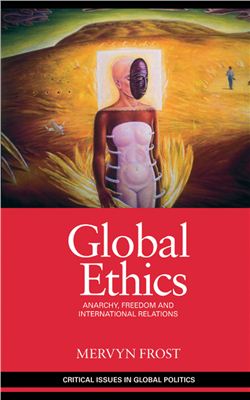Routledge, 2009. 182 p.
This provocative and original book challenges the commonplace that contemporary inteational interactions are best understood as struggles for power. Eschewing jargon and theoretical abstraction, Mervyn Frost argues that global politics and global civil society must be understood in ethical terms. Inteational actors are always faced with the ethical question: So,what ought we to do in circumstances like these? Illustrating the centrality of ethics to our understanding of global politics and global civil society with detailed case studies, Frost shows how inteational
actors constitute one another in global social practices that are underpinned by specific ethical commitments.
Case Studies examined include: The War on Iraq, The ‘Global War on Terror’, Iran, Human Rights, Globalization and Migration, The use of Private Military Companies
Global Ethics forces readers to confront their own necessary ethical engagement as citizens and rights holders in global society. Failure to understand inteational relations in ethical terms will lead to misguided action. This book should be read by all scholars and students of inteational relations as well as the general reader seeking an accessible account of the importance of ethical decisions in world affairs.
The ubiquity of ethics in inteational relations.
Inteational ethics: thick or thin?
Taking the ethical tu.
Social practices, actors and ethics.
Power, politics and ethics.
The primacy of ethics.
Understanding inteational relations in ethical terms.
War in Iraq understood in ethical terms: the Baker Hamilton Report and other interpretations Global ethical practices.
The anarchical society of sovereign states.
Evaluating rival appraisals.
In defence of anarchy: freedom and diversity.
The anarchical society of civilians: global civil society.
Private military companies: contested appraisals.
In defence of anarchy: freedom and diversity.
Evaluating the rival readings of PMCs.
Global civil society: a recapitulation.
Ethical incoherence: Individual rights versus states’ rights.
Rights and sovereignty: reframing the tension.
The ethical underpinning of double anarchy.
Ethical transformation in a double anarchy.
Migrants in world politics.
Assessing humanitarian intervention.
Assessing globalization.
Understanding torture in inteational relations.
The security of anarchies: threats and defences.
Global terrorism understood in ethical terms.
The threat of self-destruction in civil society.
The threat of self-destruction in the society of sovereign states.
Defending anarchies.
This provocative and original book challenges the commonplace that contemporary inteational interactions are best understood as struggles for power. Eschewing jargon and theoretical abstraction, Mervyn Frost argues that global politics and global civil society must be understood in ethical terms. Inteational actors are always faced with the ethical question: So,what ought we to do in circumstances like these? Illustrating the centrality of ethics to our understanding of global politics and global civil society with detailed case studies, Frost shows how inteational
actors constitute one another in global social practices that are underpinned by specific ethical commitments.
Case Studies examined include: The War on Iraq, The ‘Global War on Terror’, Iran, Human Rights, Globalization and Migration, The use of Private Military Companies
Global Ethics forces readers to confront their own necessary ethical engagement as citizens and rights holders in global society. Failure to understand inteational relations in ethical terms will lead to misguided action. This book should be read by all scholars and students of inteational relations as well as the general reader seeking an accessible account of the importance of ethical decisions in world affairs.
The ubiquity of ethics in inteational relations.
Inteational ethics: thick or thin?
Taking the ethical tu.
Social practices, actors and ethics.
Power, politics and ethics.
The primacy of ethics.
Understanding inteational relations in ethical terms.
War in Iraq understood in ethical terms: the Baker Hamilton Report and other interpretations Global ethical practices.
The anarchical society of sovereign states.
Evaluating rival appraisals.
In defence of anarchy: freedom and diversity.
The anarchical society of civilians: global civil society.
Private military companies: contested appraisals.
In defence of anarchy: freedom and diversity.
Evaluating the rival readings of PMCs.
Global civil society: a recapitulation.
Ethical incoherence: Individual rights versus states’ rights.
Rights and sovereignty: reframing the tension.
The ethical underpinning of double anarchy.
Ethical transformation in a double anarchy.
Migrants in world politics.
Assessing humanitarian intervention.
Assessing globalization.
Understanding torture in inteational relations.
The security of anarchies: threats and defences.
Global terrorism understood in ethical terms.
The threat of self-destruction in civil society.
The threat of self-destruction in the society of sovereign states.
Defending anarchies.

